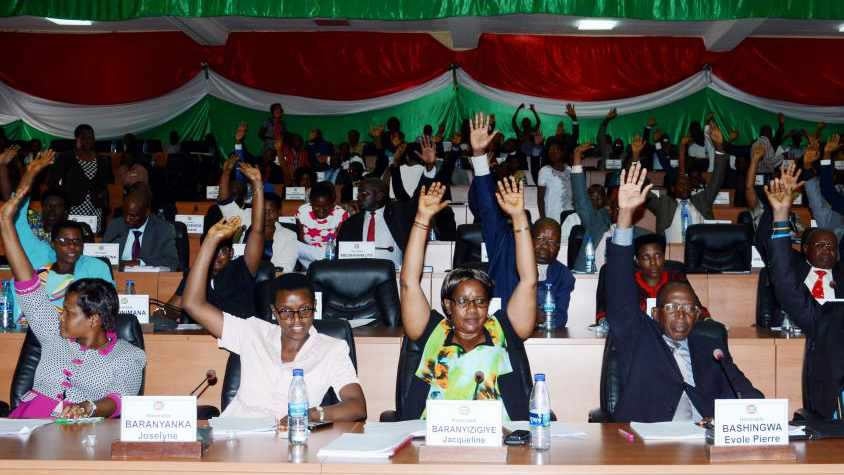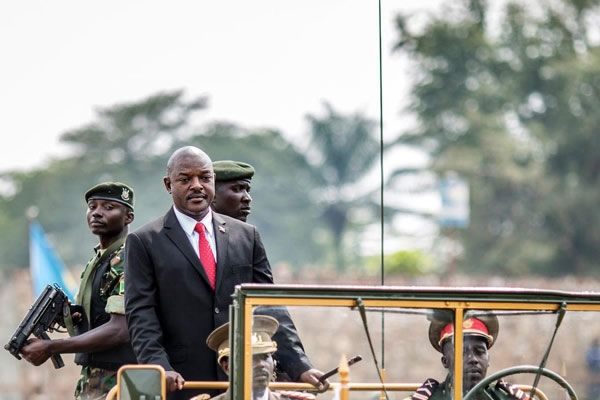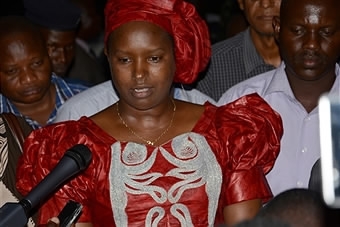
Politics
08:50, 28-Oct-2017
Burundian officials celebrate withdrawal from ICC amid row
CGTN

Senior Burundian judicial, administration and police officials on Friday met to celebrate the country's withdrawal from the International Criminal Court (ICC), which the country's justice minister said is a victory for Burundi.
Burundi's withdrawal took effect on Friday, a year after the country filed its application to the Secretary-General of the United Nations.
Burundian President Pierre Nkurunziza signed a decree on the country's pullout of the Rome Statute of the ICC on October 18, 2016, following a bill passed on October 12, 2016, by both chambers of the Burundian parliament.

Burundi's President Pierre Nkurunziza at a national event at Prince Louis Rwagasore Stadium in Bujumbura, July 1, 2015. /AFP Photo
Burundi's President Pierre Nkurunziza at a national event at Prince Louis Rwagasore Stadium in Bujumbura, July 1, 2015. /AFP Photo
"Without any problem, in total peace and security, we have been able to leave ICC. Let's rejoice," said Justice Minister Aimee Laurentine Kanyana at the meeting. She said the reason behind the departure is that it "has become an instrument of superpowers to fight against African countries."
Leaving the ICC without any pending lawsuit means that there were no crimes against humanity or genocide in Burundi in the past, she said.
According to the minister, some implementers of the Rome Statute of the ICC are "ill-intended" as they are using the ICC to "unlawfully prosecute" Burundian leaders and other leaders on the African continent.
During the meeting, the minister also said that leaving the ICC does not mean allowing impunity to take place in Burundi.

Burundian Justice Minister Aimee Laurentine Kanyana speaks to journalists on January 27. /AFP Photo
Burundian Justice Minister Aimee Laurentine Kanyana speaks to journalists on January 27. /AFP Photo
"Measures were taken to strengthen judicial institutions. Police and administration authorities are rather going to work hard in such a way to cooperate in the fight against crimes," said Kanyana.
The country's jurisdictions should "timely" prosecute criminals in order to show the international community that the country's judiciary is able to deal with all judicial cases, she said.
Some political parties like the Union for Peace and Development (UPD-Zigamibanga) also congratulated the Burundian government for the move.
"Burundi has made a big step as it joined other superpowers and some African countries that did not ratify the Rome Statute of the ICC. As a member of the Rome Statute of the ICC, Burundi gained nothing," said the party chairman Abdul Kassim.
Opposition parties are, however, against the withdrawal.
"National courts and tribunals have failed to deal with big cases since Burundi's independence. President Melchior Ndadaye for instance was killed, but national jurisdictions have until now been unable to identify or sanction his killers," said Leonce Ngendakumana, vice chairman of Sahwanya-FRODEBU, on Friday.

Political violence erupted in Burundi after President Pierre Nkurunziza sought a third term, sparking a preliminary examination by the International Criminal Court. /AFP Photo
Political violence erupted in Burundi after President Pierre Nkurunziza sought a third term, sparking a preliminary examination by the International Criminal Court. /AFP Photo
"Leaving the ICC is therefore a big loss as it could help us prosecute such criminals," he said.
He added that it is suicidal for Burundi to leave the ICC because the country will not even be able to file a lawsuit at the ICC against another country or individuals who will have offended the nation.
Burundi signed the Rome Statute on January 13, 1999, and deposited its instrument of ratification of the Rome Statute on September 21, 2004.
Source(s): Xinhua News Agency

SITEMAP
Copyright © 2018 CGTN. Beijing ICP prepared NO.16065310-3
Copyright © 2018 CGTN. Beijing ICP prepared NO.16065310-3